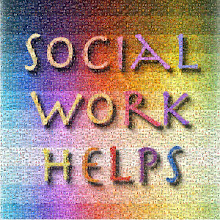
I've been wondering about boundaries that as social workers are generally hammered into our heads. Do other disciplines and other helping professions receive the same boundary awareness training that we social workers receive? I can't quite figure it out.
- A therapist brings his wife and children to a patient's house to clean it for her.
- A chaplain adds a patient's adult daughter as a friend on Facebook
- A professor sleeps with a student.
- A doctor sleep with a resident.
- A (fill in the blank) sleeps with a (fill in the blank)
- A nurse buys groceries for a patient because his fridge is empty.
- An aide invites a patient who got kicked out of his home to come and stay at her place.
- A volunteer spends the night at a patient's house because "I just felt like she needed me to be there."
- A nurse notices a patient's mattress springs are poking out of a patient's bed, so she purchases a new mattress for her and delivers it personally.
- A volunteer gives a patient a suppository. ("I just decided that I was his friend for a few minutes and not his volunteer").
- A social worker sleeps with a client. ("I just decided that I was his lover for an hour and not his social worker").
In my opinion, the majority of people who choose to do the actions listed above (all of them made up. Any similarities to actual persons, living or dead, is purely coincidental) do it not to meet the need of the patient or client, but to meet their own needs. In an agency where things like that are expected and even encouraged, the need might be to seek after praise or recognition, or to combat the fear of losing one's job in the uncertain economy. Those who choose to respect professional boundaries may be seen as callous or jaded or out of touch with what the client "really" needs. I think what most clients need are professional, kind people who know how to get them in touch with their needed resources.
When I worked in foster care, I met kids and families that I just wanted to take home with me. Heck, when I taught swimming lessons, I met kids and families that I just wanted to take home with me. Why didn't I? Well, aside from the fact that I would not survive as a foster parent at the moment... duh.. boundaries. I'm sure we've all met people who we love and want to do anything for. But in these cases, it is best to keep our professional distance.
Boundaries protect us. Just like boundaries in our personal lives protect us (choosing not to drink alcohol protects me from drunkenness; choosing to wait until marriage for sex protects me from STDs; choosing to fasten my seat belt protects me from many injuries). We draw our own boundaries in our personal lives. In our professional lives they are drawn for us. At least I thought so.



 7:04 PM
7:04 PM
 Social Work Helps
Social Work Helps

 Posted in:
Posted in: 










0 remarks:
Post a Comment